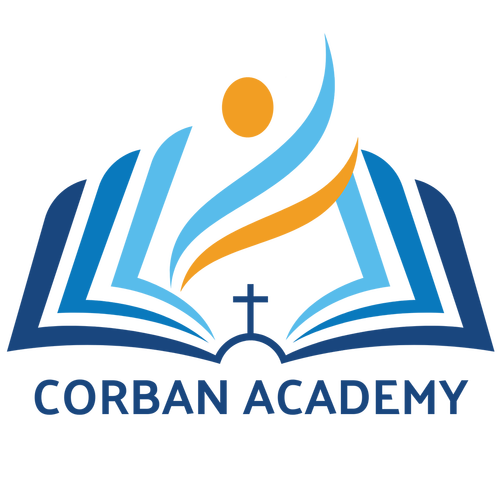
To Parents and Students
Corban Academy began as an idea that there must be a better way to prepare students for life after school. The primary purpose of education is to teach people how to learn. With the acknowledgement of different learning styles, Corban Academy approaches education from the perspective of a learning environment as opposed to the perspective of a teaching environment. This addresses the primary disconnect that students have with learning.
Corban Academy aims to cater to students on an individual basis instead of the one-size-fits-all approach of the teaching environment. Corban Academy recognizes that for a student to leave Corban Academy and be prepared to become productive members of society, they need academic, intellectual, emotional, social, and spiritual training. There are many World Views. Corban Academy trains students in the Biblical World View. There are many academic philosophies. Corban Academy trains students in a Classical and Historical academic philosophy, emphasizing analytical and critical thinking skills through the use of classic literature and historical texts. The skill sets that Corban Academy prioritizes to be successful in life are Critical Thinking Skills, Communication Skills, Teamwork Skills, Interpersonal Skills, and Time Management Skills, though there are many other skill sets necessary to be successful in life. The development of abilities to Follow Directions, Pay Attention to Details, and a Strong Work Ethic are also priorities for Corban Academy. In addition, Corban Academy emphasizes character development as integrated into the Accelerated Christian Education curriculum that Corban Academy uses. Intellectual honesty (which requires honed critical thinking skills, open and honest debate, an examination of current events in light of classical and historical texts, and an understanding of scientific method) and training in classical Judeo-Christian morality are the foundation to godly character development.
Corban Academy promotes a core conviction of lifelong learning. Therefore, Corban Academy strongly encourages students to participate in the opportunities to gain college credit through our partnerships with Grand Canyon University and Hawaiʻi Community College. In our current society, all skilled work requires post K-12 education, although not all skilled work requires a Bachelor’s degree. At Corban Academy, students are able to take up to 60 hours of college courses in lieu of our traditional 10-12 grade curriculum. This means that upon completion of their time at Corban Academy, students will have completed general course requirements for any post-Corban Academy degree program. Students who participate in these opportunities will have developed the independent skills necessary to complete any program. Corban Academy emphasizes preparing students for skilled labor with the commensurate character and social development necessary to be an active, productive participant in their communities.
One of Corban Academy’s main focuses is on young people reaching their God-given potential and participating in their God-given call, as Corban Academy believes that God created each person for a specific purpose. (Eph 2:10, Jer 29:11) Corban Academy assists parents in the task of training young people to reach their potential and participate in their God-given call. Corban Academy gives each student daily opportunities to learn to love, honor, and obey God and His Word. For then, those who complete the Corban Academy program achieve the words of Joshua 1:8, “You will make your way prosperous, and then you will have good success.”
God has given parents the responsibility for their children (Deuteronomy 6, Ephesians 6:4). Parents are to “train up a child in the way they should go” (Proverbs 22:6). Parents are charged with bringing up their children “in the discipline and instruction of The Lord” (Ephesians 6:4). Corban Academy is a resource, a tool for parents, to help with this “discipline and instruction of The Lord.” Corban Academy has an expectation of parental involvement in setting academic goals for daily, weekly, monthly, quarterly, and annual student achievement. Corban Academy has an expectation of parental communication with Corban Academy Staff on a weekly basis through the Corban Academy app. Corban Academy has an expectation of parental involvement in the life of Corban Academy through participation in a parent/teacher organization, participation in Corban Academy events, and participation in Corban Academy fundraisers. Corban Academy expects parents to participate in learning and growing in their parental skills through the uniqueness of Corban Academy’s approach to education. Corban Academy perceives parental involvement as essential for students to become productive members of society post-Corban Academy.
Corban Academy’s strategy of Cultivate-Activate focuses on developing each student, based on their God-given call and their unique blends of talent, ability, and gifting. While Corban Academy uses Career Path Assessments regularly to help students discover their optimum career paths, Jesus is central as the Giver of the student’s call and unique blends of talent, ability, and gifting. Therefore, every lesson, every activity, and every interaction will have a focus on Jesus and His Word. Every day has individual Bible Reading and Chapel. Every lesson contains Scripture. The Word of God is Truth (John 17:17) and The Word of God is the Power of God in action (Romans 1:16). Therefore, education that is based on the absolute, unchanging Truth of God’s Word, is spiritually, morally, and academically superior to an education founded on the shifting sands of changing cultural norms, moral relativism, and man-made philosophical systems.
All of Corban Academy’s teaching methods, initiatives, policies, and procedures are carried out with the aim of accomplishing the educational philosophy outlined above.
Corban Academy seeks to minister to the needs of the whole child and to encourage each child’s academic and intellectual progress, each child’s social and physical development, and each child’s spiritual and moral growth.

Academy Goals
Physical Goals
- Teach students about the human body and good health practices including effective strategies for proper rest, diet, and exercise (1 Corinthians 6:19-20; 1 Timothy 4:8).
- Teach students to develop habits of neatness, modesty of dress, and good hygiene (1 Corinthians 6:19-20; 1 Timothy 2:9-10; 1 Peter 3:3-4).
- Encourage students to engage in outdoor play and athletic activities for the betterment of their physical health, inspire their imaginations, and further their social development (1 Corinthians 6:19-20; 1 Timothy 4:8).
- Teach students the value and nobility of whatever physical work is necessary to be clean, respectful, and industrious members of their community (Proverbs 21:25; 24:30-34; 1 Thessalonians 2:9).
Social Goals
- Encourage and cultivate a sense of Christian community (John 13:34,35, Acts 2:42, 1 Cor 14:3, Eph 4:12-16).
- Teach each student to love others as Jesus loves them (Leviticus 19:18; Matthew 19:19, John 13:34,35, 15:12).
- Cultivate an environment of encouragement, affirmation, and challenge to be and do your best (Psalm 1:1; Ecclesiastes 4:9-12; 2 Corinthians 6:14-15).
- Teach students to exhibit a strong work ethic (Proverbs 21:25; 24:30-34; Colossians 3:23; 1 Thessalonians 2:9; 2 Thessalonians 3:10).
- Help students develop decision-making, planning, and management skills needed for sound judgments and personal problem-solving (Proverbs 16:3; Matthew 25:14-30).
- Help students understand and accept their responsibilities as citizens of the United States of America, encourage patriotism, and inspire them to participate in responsible government (Romans 13:1-7; 1 Timothy 2:1-4).
- Encourage students to make choices beyond Corban Academy that will lead to the further development of their gifts, abilities, knowledge, and interests to the glory of God (1 Corinthians 10:31).
- Instill in each student a strong sense of personal responsibility for their behavior, including a willingness to admit fault and accept correction when necessary (Proverbs 12:1; Hebrews 12:11).
- Teach students to respond to others and to deal with conflict in a biblical manner (Proverbs 16:28; 21:23; Matthew 18:15-17; Ephesians 4:29).
Spiritual Goals
- Give Jesus Christ the preeminence in all school matters (Colossians 1:17-18).
- See every student as a Disciple of Jesus Christ and therefore invest in each student as if it were Jesus investing in each student (Matt 28:18-29, John 13:34,35).
- Partner with the parents of each student in the nurturing and admonition of the Lord (Deuteronomy 6:4-9; Ephesians 6:4).
- Develop within each student a spiritual knowledge base founded on God’s Word, the Bible, for making wise decisions about life, and to teach accurate Bible doctrine (2 Timothy 3:14-17). See Corban Academy’s Covenant of Faith.
- Help students develop a love for God that extends to the entirety of their hearts, souls, and minds (Deuteronomy 6:5).
- Teach students the responsibility that every person has to God as Creator and Redeemer as well as to their community (2 Corinthians 5:10).
- Help students develop a strong sense of “right and wrong,” to make each student aware of the spiritual blessing that comes from doing right, and to warn each student of the many wrongs that now characterize our culture and the negative consequences to be borne by those who choose those wrongs (Exodus 20:1-17; Romans 3:23; Romans 6:23).
- Develop a Biblical worldview in the minds of all students. With this worldview in place, students should be able to discern between truth and error. Not only is it our goal to present truth but also to instruct our students how to apply the truth correctly in their own lives (Psalm 19:14; 2 Corinthians 10:4-6).
- Help students continue their walk with the Lord outside of school, and for life, through regular Bible reading and prayer (Proverbs 22:6; 1 Thessalonians 5:17).
- Encourage students to take an active part in the ministry of the local church (Hebrews 10:24-25; Acts 1:8).
Academic Goals
- Corban Academy’s purpose is to help prepare students for life after school. Therefore, Corban Academy’s academic goals are wide and diverse including but not limited to: Proficiency in Science, Technology, Engineering, Arts, and Math.
- In addition to the “hard skills”, the following “soft skills” are academic goals for Corban Academy students:
- Critical Thinking Skills
- Problem Solving Skills
- Teamwork Skills
- Communication Skills
- Interpersonal Skills
- Project Management Skills
- Time Management Skills
- Independent Thinking Skills
- Ethical Decision-Making Skills
- Planning, Organization, and Prioritization Skills
- Listening Skills
- Application Skills - In addition to the “hard skills” and the “soft skills” Corban Academy sets the following abilities as goals:
- The Ability to Follow Directions
- The Ability to Maintain Accuracy without sacrificing productivity
- The Ability to Pay Attention to Detail
- The Ability and Willingness to Learn new skills
- The Ability to maintain standards of Motivation, Appearance, and Punctuality
- In all these skills and abilities Corban Academy sets the goal for each student of developing a Strong Work Ethic and a Professionalism in social comportment. - Other academic goals for Corban Academy include:
- Both curricular and instructional systems that will enable any student to achieve at levels necessary to prepare them to enter the next level of education chosen, whatever the academic rigor demanded.
- Teach the value of diligent study of the Bible as not only a spiritual process, but also an intellectual and academic process (2 Timothy 3:14-17).
- Instill a strong sense of personal responsibility. This includes a willingness to accept correction but also the confidence and self-worth to work hard and to pursue the highest possible levels of achievement (Proverbs 12:1; 2 Timothy 3:16-17; Hebrews 12:1).
- Develop confidence, self-direction, and the passion to be lifelong learners (Proverbs 4:13).
- Teach students to enjoy reading from a perspective of introducing new ideas, positions, and debates while helping students to critically evaluate those new ideas, positions, and debates.
- Teach students effective communication techniques both oral/auditory and written.
- Teach students scientific methods to learn about the physical universe God has created (Genesis 1-2; Psalm 19:1-4).
- Teach students basic information technology skills.
- Teach students practical application of science, design, arts, and math.
- Help students understand fundamental math concepts and processes, as well as practical applications.
- Give students a broad understanding of history, geography, and other social studies (Deuteronomy 6:12; Deuteronomy 8:2; Joshua 4).
- Help students develop an appreciation of the arts and expose students to the joy of expression through the arts (Psalm 150).
